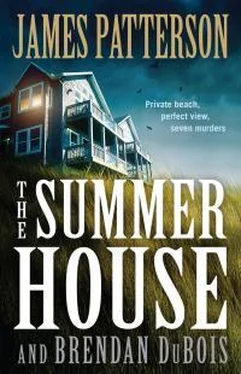I ask, “And Staff Sergeant Jefferson?”
Huang pauses, then says, “He was the surprise. I didn’t expect him to talk to me, but he did…and he wasn’t happy I was there. Threatened to hurt me if I came back and talked to the Rangers again. But he let something slip in our talk, when he was getting angry with me. Major, he practically admitted he and his Rangers were there that night.”
We all get quiet. Someone’s pounding at the door, claiming to be from the New York Times . Or the Washington Post . I’m not sure and I don’t care.
“Go on,” I say.
“I told him that we were here to find out the truth, especially if it might be able to help him and his men,” Huang carefully says. “And he threw that right back in my face. Said something to the effect that the families of those who resided in that old historical house wouldn’t forget what happened that night.”
Silence in our little room.
Huang shakes his head. “Major, they’ve been there. They know what the location looks like. Sir, based on what we’ve learned so far, the matched empty shell casings and the fingerprints, I think they were at that house and slaughtered those civilians.”
That hangs in the air for a moment, and then my cell phone rings. ANONYMOUS CALLER, the screen states.
“Cook,” I answer.
The man’s voice is low and to the point. “Your goddamn killers butchered our neighbors. You think you’re going to help ’em get away with it, you’re wrong. Pack up and go back to DC, assholes.”
I say, “We’re actually from Quantico.”
By then the man has hung up.
Chapter 26
I BRUSH OFF the phone call—I heard much worse said to my face working Midtown South—but my doctor’s considered statements have made my stomach do a slow flip.
“It seems the locals love us,” I say. “Is there anything else, Doc?”
“No, sir,” he says. “I’ll report back tomorrow after I try to interview Specialist Tyler again.”
More pounding on the door. This time it’s CNN. Then they go away and it’s quiet again.
“Captain Pierce,” I say, “did you meet with the district attorney?”
“Affirmative, sir,” he says. “Cornelius Slate. Runs the county’s business out of his office. Looks like the stereotypical small-town lawyer, but he’s got serious legal chops. Graduated from George Mason and was a high-priced corporate lawyer for years before retiring to Sullivan. Bad news for the Rangers is that justice moves slowly in this county. It might be weeks or even months before an indictment is prepared, and in the meantime, he’s told me that he’s gung-ho to put all four of them on death row.”
“Anything else?”
Pierce frowns. “He didn’t come out and say it, but I have a sense he might be the local chapter head of the Sons of the Confederacy. And that’s all I got for now.”
“Good to know,” I say. “Agent Sanchez? You’re up.”
Sanchez leans forward in his chair, clasps his hands together. “Sheriff Williams said there was a female witness out walking her dog who saw a pickup truck depart the crime scene the night of the murders. I tracked her down. Wendy Gabriel. She confirms what the sheriff said, recalls seeing a truck after hearing some gunshots, and spotted two men in the cab when they stopped under a utility light.” He waits, then says, “But she’s lying.”
A second ago Huang was doodling on his pad, Connie was rearranging her bag, and Pierce was tearing apart a doughnut and eating it.
Now they are all staring at Sanchez.
“How?” I ask.
“I went to the road where she says she was walking her dog and saw the truck stop and then depart. I parked my rental underneath the utility light, near the driveway that goes to The Summer House. It’s barely working. I folded my jacket, draped it over the seat of the car. Major, I couldn’t see the buttons on my jacket. How could she see two men and later ID them in a photo lineup?”
Connie says, “Maybe their interior light was on.”
Sanchez sits up, shoots back, “After committing multiple homicides? You think so, Connie? You learn that chasing down speeders outside the Beltway?”
Connie starts talking—I know Sanchez doesn’t have much respect for her previous service in the Virginia State Police—and Pierce and Huang try to interrupt.
Sanchez raises his voice. “But that’s not all!”
I hold up a hand. “Cool it, folks. Sanchez, what else is there?”
Sanchez’s voice gets louder, firmer, and I see the old LAPD cop in him come out.
“The woman is a hoarder,” he points out. “Lives alone except for her dog. She loves her dog. Her house is a mess except for the area where the dog food, water, treats, toys, and medicine are kept. It’s spotless. But she said to the sheriff and to me that she was walking her dog that night, along the state road. She wasn’t.”
Huang asks, “How do you know?”
Sanchez says, “There was no leash. There was no leash on the porch, there was no leash by the door, there was no leash by her dog’s area. There’s no way she was walking her dog along that state road at night without her guy on a leash. I’m telling you, she’s lying about what she was doing that night.”
I smile at my guy. “Good catch. Tomorrow pay her another visit. See what she has to say about that.”
In the next few minutes there’s more pounding at the door from various journalists, which we all continue to ignore. Sanchez is in the corner, speaking Spanish to his wife, three time zones away. Huang and Pierce discuss the challenges of finding a way to get a pizza delivered past the reporters, Connie works on her computer, and I stare at the whiteboard.
We’re starting to get evidence, which is a good thing.
But between the photos up there of the Rangers and the list of the dead civilians, there’s still a wide and visible gap.
What’s the connection?
Why were the Rangers there?
If Staff Sergeant Jefferson knows the layout of the property, doesn’t that put them there? Especially with the forensic evidence of fingerprints and shell casings?
My cell phone vibrates and I dig it out of my jacket pocket. The ID says ANONYMOUS CALLER once more.
I answer it, thinking if I’m lucky this time I’ll be told my Microsoft computer needs repairs, when a woman’s voice says, “Major Cook?”
“Here,” I say.
There’s the sound of music and people talking in the background, and she says in a louder voice, “It’s Sheriff Williams. I know it’s late and all, but I was hoping we could talk.”
“Certainly,” I say. “What’s going on, Sheriff?”
She says, “I just found out why your Rangers killed all those people.”
Chapter 27
THE PARKING LOT of the Sullivan Memorial Baptist Church is nearly packed, and Special Agent Connie York wants to drop off Major Cook and Special Agent Sanchez at the entrance, but from the rear seat her boss says, “No. We’ll all go in together.”
Connie finds a spot after a couple of minutes circling the parking lot, like a Predator drone seeking targets of opportunity. When they get out of the battered Ford Fusion and start toward the church, Sanchez looks at the hood and shakes his head.
“Great driving there, Connie,” he says. “I’m sure it’ll buff right out.”
Before Connie can shoot back a comment, Cook says, “I told her to go down that road, to follow the car that had been tailing us. Unless you want to try fixing it when we get back to the motel, knock it off, Sanchez.”
Inwardly Connie smiles as Sanchez takes the hit from the major, and the three of them slowly make their way to the side entrance of the church hall. Amplified voices come from inside the building, followed by applause and cheers. Two extended black vans pull up into open handicapped spots and the doors pop open, TV camera crews and reporters sprinting out.
Читать дальше












